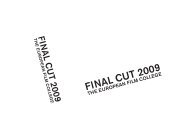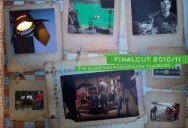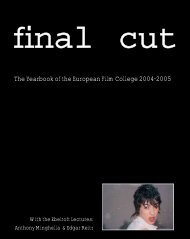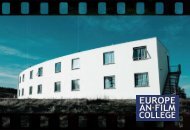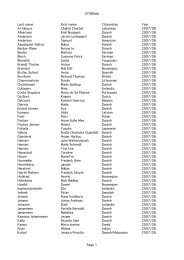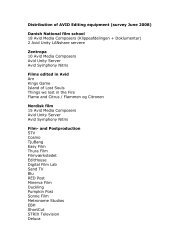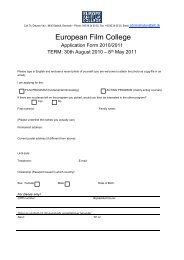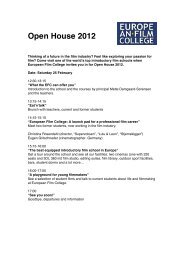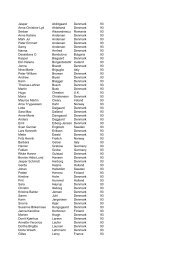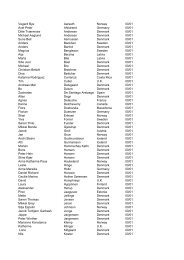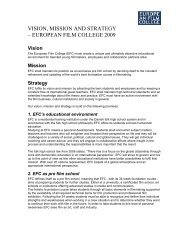yearbook 2004/05 - The European Film College
yearbook 2004/05 - The European Film College
yearbook 2004/05 - The European Film College
You also want an ePaper? Increase the reach of your titles
YUMPU automatically turns print PDFs into web optimized ePapers that Google loves.
Creating the documentary on Don Robaina<br />
By Helle Windeløv<br />
I was a student at the EFC during 2000/2001.<br />
From the very beginning of my stay, I knew that<br />
documentary was the genre I would love to explore,<br />
and during the 8 months at the college I<br />
produced three. During the last month of my<br />
stay I realized that before leaving the college I<br />
had to find out what I could do afterwards to<br />
combine my 8-month-stay here in safe and caring<br />
surroundings with the “real world outside”.<br />
It simply had to be done while I was still in the<br />
centre of the creative and inventive energy that<br />
would enable me to start up a larger documentary-production<br />
before I would be thrown before<br />
the “cruel and scary <strong>Film</strong>-industry”. A new<br />
project would keep me on tracks with what I<br />
had learnt at the EFC and preserve my passion<br />
and drive for the universe of the documentary<br />
process.<br />
So when everybody else was doing their finals I<br />
sat down to write on the idea that in the summer<br />
of 2003 – after some years of hard work – is<br />
now realized as the 50 minute long documentary<br />
from Cuba on “<strong>The</strong> Love of Don Robaina”.<br />
Don Robaina<br />
Each movie has its own individual “history of<br />
birth”, often a very long and tough birth that<br />
starts with the motivation of working with the<br />
media and the idea that you have in your head<br />
and your heart. My idea for “<strong>The</strong> Love of Don<br />
Robaina” started with my father’s passion for cigars<br />
– he is what you call a “cigar-afficionado”<br />
– with an admiration for the Cuban cigar-legend<br />
Don Alejandro Robaina and his exclusive<br />
tobacco. My father has for many years had a<br />
big, beautiful black and white photograph of<br />
Don Robaina and he has told me many stories<br />
about the dignified Cuban tobacco-farmer and<br />
his beautiful personality. He also told me that<br />
Don Robaina is known for being the best producer<br />
of tobacco in the whole wide world, as<br />
well as being a very humble and loving person. I<br />
appreciate this combination of professionalism<br />
and humbleness very much, and therefore I de-<br />
cided that I wanted to meet this man and make<br />
a portrait of him. His beautiful 83-years-old<br />
wrinkled face made me even more motivated<br />
for doing the movie. Apart from that, I had for<br />
several years wanted to see Cuba and I loved the<br />
challenge it would be to film in a country That<br />
you have never worked in before been – and in<br />
this case it is not a particularly organized place<br />
to work in! My father then passed a handwritten<br />
letter from me to Don Robaina asking him<br />
permission to make a film about him, his family<br />
and the workers on the farm and having received<br />
a positive answer to that, I left for Cuba<br />
in November 2001 – after having applied to<br />
<strong>The</strong> Danish <strong>Film</strong> Institute for support for writing<br />
the manuscript.<br />
El Niño dies<br />
A week before departure I received a mail from<br />
a friend who told me that the whole area had<br />
been ravaged by a tremendous hurricane and<br />
that Don Robaina’s plantation might be totally<br />
ruined. It was too late to cancel the ticket so I<br />
thought that if so, I would have to make a film<br />
about him in that new situation instead. Fortunately<br />
the hurricane had passed around his estate<br />
and I was allowed to shoot what I wanted together<br />
with my female Cuban assistant. I spent<br />
a month in Cuba shooting everything from<br />
the very beginning of the planting of the small<br />
seeds for tobacco, the workers, members of the<br />
family – and not least Don Robaina. While I<br />
was in Cuba I had a mail from the Danish <strong>Film</strong><br />
Institute that I might get the financial support<br />
for the manuscript and they wanted a meeting<br />
with me when I returned. Fortunately I got the<br />
money that enabled me to return to Cuba with<br />
a photographer 3 months later, in February<br />
2002, to film the harvest of the tobacco and collect<br />
the final shots of the family and the estate.<br />
Equipment was rented from DR-TV with a<br />
premature agreement on screening my movie in<br />
their slot called TV-talents. But once more ob-



